NIL
Mississippi State – Official Athletics Website
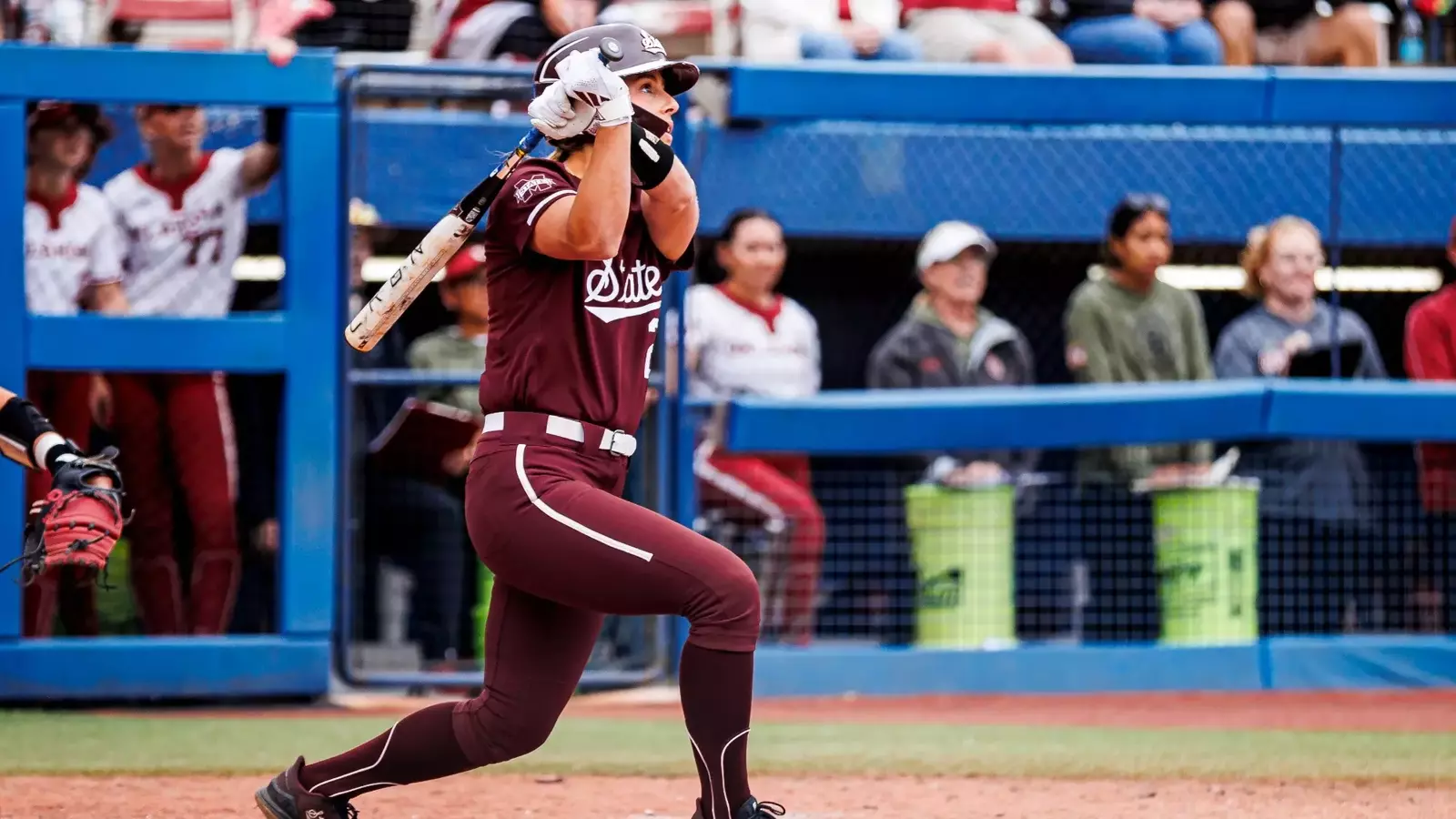
Sacco has transformed herself into one of the nation’s premier hitters in her final season, ranking among the top 15 nationally in batting average (.471), hits (72), runs (60) and on-base percentage (.565). She leads the SEC in doubles (16) and has more extra-base hits this season alone than in all prior years of her career combined. The former slapper has launched 10 homers this season, and her 45 RBIs lead a Bulldog offense that has already broken the program record for RBIs in a season.
Besides her bat, Sacco has stolen 15 bags, which leads the team. She’s been perfect defensively in centerfield and has not made an error since the 2023 season. Along the way, she’s collected four outfield assists. The Marreo, Louisiana, native has started every game her teams have played in her career, batting leadoff and playing centerfield in 219 consecutive contests. Her 98 career stolen bases are ninth among active players nationally, and her 263 hits are fifth.
Sacco marks the eighth time Mississippi State has seen a player reach the Top 25 stage in USA Softball’s Player of the Year voting. Most recently, Mia Davidson was a Top 25 Finalist in 2022 and a Top 10 Finalist in 2019. Chelsea Bramlett was in the running three times from 2008-10, finishing as high as the Top 10 in 2010. Iyhia McMichael was the program’s first finalist, reaching the Top 10 in 2003 before making the final stage as a Top 3 Finalist in 2004.
The USA Softball Collegiate Player of the Year award is voted on by previous award winners, coaching representatives from nine Division I conferences in the 10 USA Softball Regions as well as members of national and local media who consistently cover Division I softball across the country.
The Top 10 Finalists will be announced on May 14 with the Top 3 being recognized on May 19. The Player of the Year will be selected from the Top 3 Finalists and is awarded during the Women’s College World Series.
For more information on the Bulldog softball program, follow on Twitter, Facebook and Instagram by searching “HailStateSB.”
NIL
Buckeyes, Red Raiders, Hoosiers, Bulldogs are expected to advance :: WRALSportsFan.com
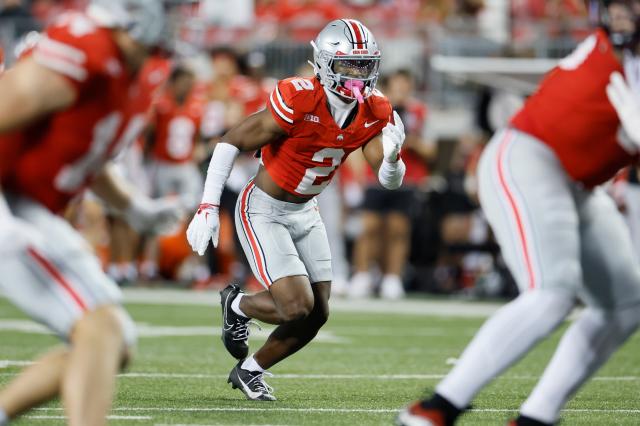
Something to watch in the College Football Playoff quarterfinals will be how sharp the teams that got first-round byes are early in their games.
No. 2 seed Ohio State will have had 24 days between games and No. 1 Indiana, No. 3 Georgia and No. 4 Texas Tech each will have had 25-day layoffs.
Last year was the first with a 12-team field, and the quarterfinals were nothing short of a disaster for the top four seeds, with extended time off the common denominator: No. 1 Oregon, No. 2 Georgia, No. 3 Boise State and No. 4 Arizona State all lost and were outscored by a total of 81-13 in the first halves. They had 14 punts, three turnovers on downs, three fumbles, two missed field goals, two field goals and two touchdowns on their first combined 26 drives.
No team struggled more than Oregon, which was unbeaten before its 41-21 loss to eventual national champion Ohio State at the Rose Bowl. The Ducks were down 34-0 in the second quarter, punting on five of their first six possessions (including four 3-and-outs) and turning the ball over on downs on the other.
The picks, with seedings and lines from BetMGM Sportsbook:
This game sets up as a showdown between two top-10 defenses at the Cotton Bowl. Ohio State scored just 10 points in its loss to Indiana in the Big Ten championship game and Miami managed just 10 in its CFP first-round win over Texas A&M.
With points at a premium, the Buckeyes will need to do a better job in the red zone. They’ve come away with touchdowns on just two of their last seven trips inside the 20-yard line. Julian Sayin also must get the ball out quickly against a front seven that sacked the Aggies’ Marcel Reed seven times. The Buckeyes’ offensive line had allowed just six sacks through 12 games before allowing five against Indiana.
Miami, which will be going against a defense allowing 213 yards and 8.2 points per game to lead the nation, needs another big game from RB Mark Fletcher and continue to find creative ways to get do-it-all freshman star Malachi Toney involved.
Pick: Ohio State 17-10.
Oregon seemed to lose interest after getting out to a 34-6 lead in a 51-34 first-round win over James Madison, and Dan Lanning and his staff were beside themselves. The Ducks should have no problem staying focused in the Orange Bowl.
Texas Tech will be their biggest challenge since Indiana went into Eugene and left with a 10-point win in October. Oregon’s Dante Moore could be the first quarterback taken in the NFL draft, and he will have ample opportunity to showcase his skills against a defense that has two AP first-team All-Americans in David Bailey and Jacob Rodriguez, a second-teamer in A.J. Holmes and a third-teamer in Lee Hunter.
The Red Raiders need to keep injury-prone QB Behren Morton upright and, like Ohio State, they need to get touchdowns instead of field goals when they get inside the red zone.
Pick: Texas Tech 27-24.
It’s the SEC vs. the Big Ten and the first Alabama-Indiana meeting ever. Old money vs. new money.
The Hoosiers’ rise under Curt Cignetti is the best storyline in college football in a long time, and the idyllic Rose Bowl setting would be just the place for it to continue with Fernando Mendoza playing his first game since winning the Heisman Trophy.
Alabama is more than capable of spoiling everything, but it can’t afford another start like it had against Oklahoma. The Crimson Tide trailed 17-0 and was out-yarded 118-12 in the first quarter before matching the largest comeback in CFP history and winning 34-24.
Indiana’s players took notice of the Tide’s perseverance and warned no lead would be safe. Cignetti will have his team playing with the pedal to the metal.
Pick: Indiana 28-17.
Mississippi beat Tulane 41-10 in the first round for Pete Golding’s initial victory as successor to Lane Kiffin, and now the competition ramps up at the Sugar Bowl.
The Bulldogs won the regular-season meeting 43-35 at home, part of their current nine-game winning streak and Mississippi’s only loss. Gunner Stockton’s two touchdown passes in the fourth quarter wiped out a 35-26 deficit; Trinidad Chambliss was just 1-of-10 passing for 1 yard over the final 15 minutes.
The Rebels will need a more even performance from Chambliss, who was terrific against Tulane, and they have to hope RB Kewan Lacy comes back after hurting a shoulder against the Green Wave.
Georgia played its best late in the season, and it will be interesting to see how much, if any, the layoff affects the Bulldogs.
Pick: Georgia 31-21.
First-round CFP games: Straight-up — 2-2; Against spread — 0-4.
Season straight up — 194-61; Against spread — 123-131-1.
____
Get poll alerts and updates on the AP Top 25 throughout the season. Sign up here. AP college football: https://apnews.com/hub/ap-top-25-college-football-poll and https://apnews.com/hub/college-football
NIL
Former five-star prospects set to enter the college football transfer portal
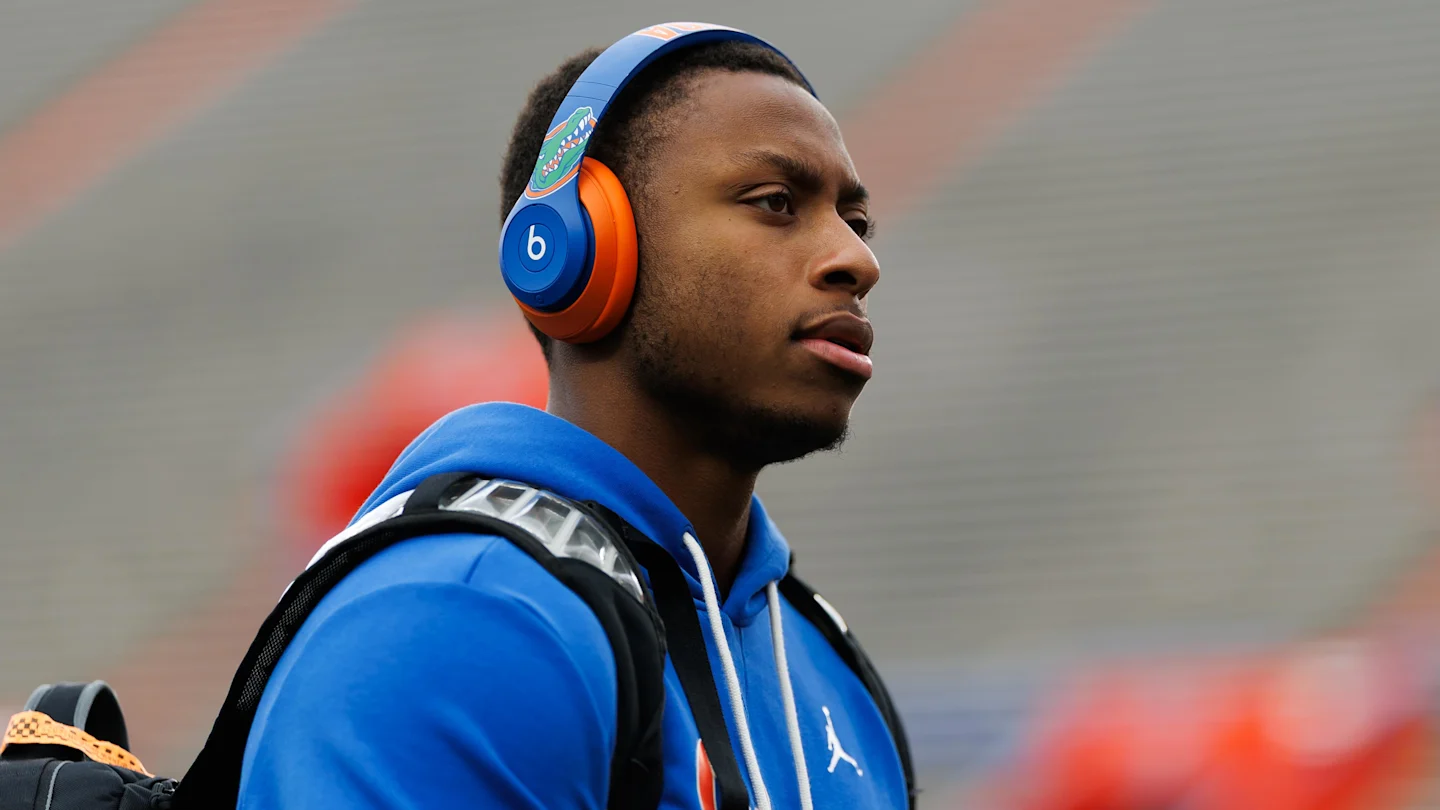
The NCAA has adjusted its transfer portal window following the 2025 college football season, creating just one transfer period compared to multiple windows in previous years. The next transfer portal window will open on Friday, January 2, 2026, and stay open until January 16.
Although the portal has not yet opened, players have been declaring their intentions to enter the portal for several weeks. Among those who have already made their intentions to transfer public are several players who were rated five stars, the highest recruiting rating possible, coming out of high school. Here are the former five-star prospects who are expected to enter the transfer portal when it opens on Friday.
DJ Lagway, QB, Florida

Expectations from the Florida faithful were high when DJ Lagway was named the starter entering the Gators’ 2025 season. Coming out of Willis High School in Texas, Lagway threw for 8,392 yards and 100 touchdowns in his prep career, earning Gatorade National Player of the Year honors as a senior. Ranked as the No. 2 overall prospect in the country by On3 and No. 3 by 247Sports, Lagway spent his true freshman season learning under veteran starter Graham Mertz before assuming the reins to the offense as a sophomore.
The 2025 season got off to a rocky start for Florida, however, with the Gators losing three of their first four games and head coach Billy Napier losing his job midway through the regular season. The issues that plagued Florida during its 4-8 campaign this past season ran deeper than just quarterback play, but Lagway’s performance did not meet expectations. The 6-foot-3, 247-pound passer threw 16 touchdowns against 14 interceptions while starting all 12 games
Dylan Raiola, QB, Nebraska

Among the biggest names entering the Transfer Portal this cycle is Nebraska sophomore quarterback Dylan Raiola. The son of former NFL offensive lineman Dominic Raiola, the younger Raiola was a five-star prospect out of Buford High School in Georgia, ranking No. 2 overall in the 2024 recruiting class according to Rivals and No. 7 overall according to 247Sports.
Raiola had an interesting recruitment, originally committing to his home-state Georgia Bulldogs before changing his commitment to his father’s alma mater, Nebraska, just before National Signing Day in December, 2023. Raiola would go on to start as a true freshman for the Cornhuskers, and has thrown for 4,819 yards, 31 touchdowns and 17 interceptions during his two seasons in Lincoln. His sophomore season came to an end with a broken leg suffered during Nebraska’s Nov. 1 game against USC. News of his plans to enter the Transfer Portal broke in mid-December, not long after Nebraska head coach Matt Rhule fired his uncle, Donovan Raiola, as the Cornhusker’s offensive line coach.
CJ Baxter, RB, Texas

One of four running backs from the Texas Longhorns’ 2025 roster to declare their intentions to enter the transfer portal, CJ Baxter Jr. was the most highly-touted of the group coming out of high school. Rated five-stars and ranked among the Top 32 prospects in the country by ON3, 247Sports and Rivals, Baxter committed to the Longhorns just before the start of his senior year of high school after a recruitment that drew interest from schools across the country.
The 6-foot-1, 227-pound Baxter flashed the potential early in his Texas career that earned him five stars as a recruiting prospect. He started six games his freshman season, rushing for 659 yards and five touchdowns en route to Big 12 honorable mention all-conference honors. A pre-season injury derailed Baxter’s sophomore campaign, however, and by the start of the 2025 season he found himself fighting for carries in a crowded Longhorn backfield, finishing the season with just 196 rushing yards and just one touchdown.
Cam Coleman, WR, Auburn

After announcing his intentions on Monday, former five-star wide receiver prospect Cam Coleman immediately became one of the biggest names expected to enter the Transfer Portal this week. In two seasons at Auburn, the 6-foot-3, 201-pound Coleman racked up 93 receptions for 1,306 yards and 13 touchdowns, leading the Tigers in receiving yards and receiving touchdowns this past season.
Coleman’s collegiate productivity was widely predicted coming out of high school, where he was ranked five-stars by all the major recruiting services, with Rivals (7th), 247Sports (5th) and On3 (3rd) all including the Phenix City, Ala., product in the Top 10 of the 2024 recruiting rankings. He committed to Auburn in December of his senior year after previously having been committed to Texas A&M. Auburn changed head coaches this year, firing Hugh Freeze in November and bringing in Alex Golesh right after the regular season concluded.
Tunmise Adeleye, DL, UNLV

The oldest player on this list, Adeleye was part of the same 2021 recruiting class that produced current NFL stars like Emeka Egbuka and Caleb Williams. Ranked as the No. 25 overall player and No. 3 strongside defensive end in that class by Rivals, Adeleye would go on to sign with Texas A&M, helping the Aggies to a Top 10 recruiting class ranking that cycle.
Adeleye would not stay long in College Station, however. In fact, the 6-foot-4, 275-pound prospect is now looking for his fifth collegiate home after spending time at Michigan State, Texas State and, most recently, UNLV thus far in his college career. This past season with the Rebels Adeleye earned honorable mention all-Mountain West honors while collecting 25 total tackles, including two sacks.
NIL
Can NIL Buy a National Championship?
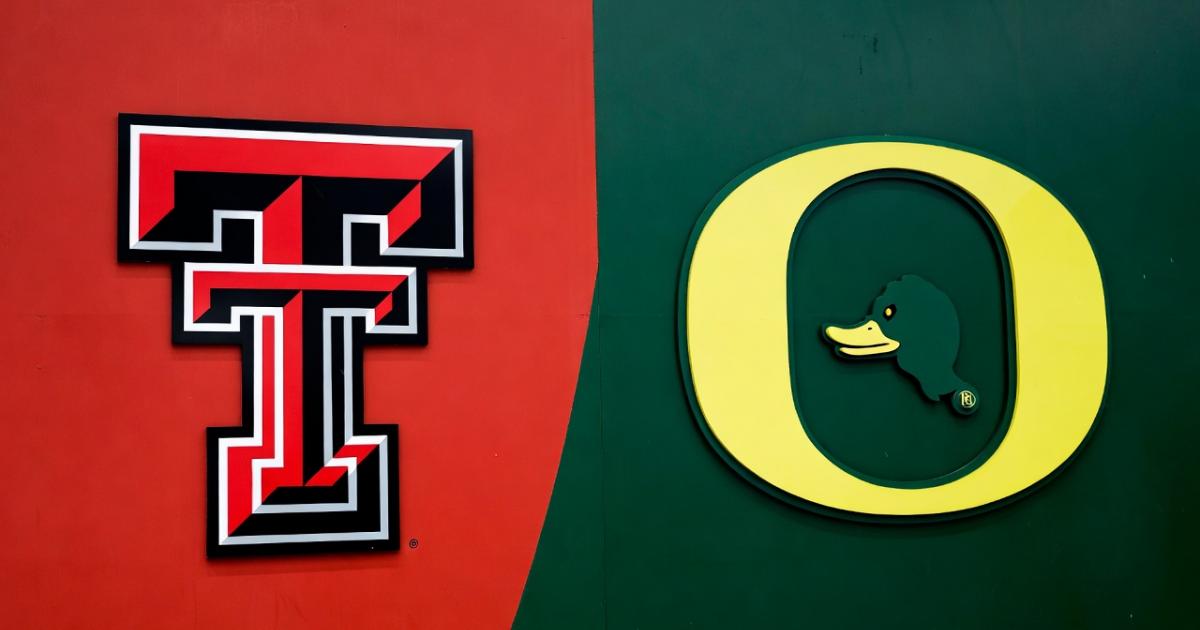
SAN ANGELO, TX — In the high-stakes world of college football, where talent is the ultimate currency, the introduction of Name, Image, and Likeness (NIL) deals in 2021 has transformed recruiting and roster-building into a financial arms race.
As the 2025 season winds down with the College Football Playoff (CFP) quarterfinals looming, one question echoes across the Lone Star State: Can pouring millions into NIL truly buy a national championship?
Texas (the entire state, not the university) provides a compelling case study, with four powerhouse programs—the University of Texas Longhorns (UT), Texas A&M Aggies (A&M), Texas Tech Red Raiders (TTU), and Southern Methodist University Mustangs (SMU)—each wielding significant NIL war chests but yielding varied results. From booster-fueled spending sprees to community-driven collectives, their approaches highlight the promise and pitfalls of this pay-to-play era.
As of today, the Texas Tech Red Raiders remain in contention for the national title, set to face the Oregon Ducks in the Orange Bowl CFB quarterfinals at 11 a.m. Central Time on January 1.
NIL is a Billion-Dollar Game Changer
Since the NCAA greenlit NIL, the market has exploded, projected to hit $1.7 billion for the 2024-2025 season, with over $1.1 billion funneled into football alone. Proponents argue it levels the playing field by compensating athletes fairly, while critics decry it as a system where deep-pocketed boosters “buy” rosters, eroding the amateur spirit.
Adding fuel to this evolution is NIL revenue sharing, stemming from the landmark House v. NCAA settlement approved in June 2025. Effective July 1, 2025, this system allows Division I schools to directly distribute a portion of their athletic department revenues—up to a cap of $20.5 million for the 2025-26 academic year—to student-athletes across sports. This cap is expected to increase by 4% annually, with potential exceptions, and is designed to compensate athletes more like professionals while maintaining some regulatory oversight through the new College Sports Commission.
Unlike traditional NIL deals, which involve third-party endorsements and sponsorships from brands or collectives, revenue sharing comes straight from school funds (e.g., ticket sales, media rights, and sponsorships), functioning more like a salary pool.
Schools opting in (most Power Four programs have) must report third-party NIL payments to ensure transparency, but the system coexists with NIL, allowing total athlete compensation to exceed the cap through combined efforts.
This has led to “payrolls” where revenue sharing covers base pay, and NIL handles bonuses or incentives, though critics argue it exacerbates inequities between resource-rich and smaller programs. In Texas, oil money and alumni networks have propelled programs to the forefront, yet success isn’t solely about the dollar amount—it’s about strategy, coaching, and execution.
Comparing the NIL Approach of Four Texas Teams
Texas’s college football landscape illustrates diverse strategies in blending revenue sharing with NIL. All four programs have opted into the settlement, leveraging the $20.5 million cap to boost recruiting and retention amid the expanded CFP.Team
This table compares the NIL approach of Texas athletic programs (it’s responsive, so use your mouse or finger to scroll right and left)
| Team | Revenue Sharing Cap Utilization | Key Approach Details | Integration with NIL | 2025 Impact Highlights |
|---|---|---|---|---|
| UT Longhorns | Full $20.5M, part of $35-40M total football payroll | Phasing out NIL collectives in favor of direct revenue sharing; focuses on structured contracts for efficiency. | Combined with Longhorn Sports Agency (launched June 2025) for brand deals and content creation; alumni/tech boosters fund extras. | Enabled 10-2 record and CFP berth; high-profile deals like Arch Manning’s $3.5M+ NIL boosted talent influx, though playoff exit showed limits. |
| A&M Aggies | Full $20.5M, with min. $2.5M to women’s sports; spread across six programs | Community-driven distribution tied to performance/academics; uses Teamworks for streamlined payments. | $39.1M in NIL support FY24-25 via Aggie NIL and Playfly; focuses on guaranteed contracts and retention. | Fueled 11-2 season and playoff spot; tripled NIL from prior year, but late losses highlighted distribution inefficiencies. |
| TTU Red Raiders | Full $20.5M integrated into $55M planned NIL + sharing for 2026 | Booster-led (e.g., Cody Campbell’s influence); one-year contracts for 97 football players; new corporate unit for growth. | Merged Matador Club into Red Raider Club; smashed NIL records with $28M football spend in 2025. | Powered 12-1 record, Big 12 title, and CFP quarterfinal; rapid escalation transformed program, though donor dependency raises sustainability questions. |
| SMU Mustangs | Full $20.5M via Student-Athlete Benefit Fund | Integrated revenue/NIL/brand unit; focuses on holistic athlete support and corporate partnerships. | Boulevard Collective and Mustang Partners (launched Dec. 2025) for deals; Scout platform streamlines earnings and education. | Boosted ACC debut with 10-2 record, playoff berth; historic revenue jumps (157% football tickets), portal success, but chaos concerns from NIL/portal dynamics. |
The Longhorns’ Corporate NIL Powerhouse
The Longhorns, now in their second SEC season, boast what many consider the nation’s top NIL budget: an estimated $35-40 million dedicated to their football roster for 2025.
Through the Texas One Fund and a partnership with Learfield’s Longhorn Sports Agency (launched in June 2025), UT has adopted a professionalized model, emphasizing brand-building, financial literacy, and high-profile endorsements. Star quarterback Arch Manning’s deals alone reportedly exceed $3.5 million annually, drawing transfers and blue-chip recruits.
This investment paid dividends with a 10-2 regular season, an SEC Championship Game appearance, and a CFP berth. However, playoff shortcomings—including a first-round exit—raise questions about ROI. A high-ranking UT source disputed the $35-40 million figure earlier this year, calling it “irresponsible reporting,” but insiders maintain it’s the benchmark for SEC elites.
“Texas is built for the long haul,” said one analyst. “NIL keeps them competitive, but championships require more than money—ask the Yankees in baseball.”
The Aggies’ “12th Man” Community Approach to NIL
About 100 miles east of Austin, in College Station, the Aggies have taken a more diversified tack via Texas Aggies United, amassing $51.4 million in total NIL revenue from July 2024 to June 2025—nearly tripling the previous year’s haul. An overwhelming 96% ($49-50 million) flowed to men’s sports, with football claiming the lion’s share through guaranteed contracts tied to performance and academics.
This “retain at all costs” philosophy, bolstered by alumni and corporate sponsors, has secured talents like quarterback Marcel Reed and wide receiver Mario Craver.
The result? An 11-2 campaign, a playoff spot, and early-season dominance, only to falter with late losses to rivals Texas and in the CFP first round.
Critics point to gender disparities (minimal funding for women’s sports) and question if the broad distribution dilutes football’s edge in the brutal SEC. Still, A&M’s model emphasizes sustainability, positioning them as a top-5 NIL spender nationally.
“It’s not just about the check—it’s about building a culture,” an Aggies booster noted, echoing the program’s “12th Man” ethos.
All of the Oil Money Funding Texas Tech’s NIL Program
In Lubbock, the Red Raiders represent the underdog story of NIL efficiency. Led by billionaire alum Cody Campbell’s $25 million donation to The Matador Club, TTU shelled out over $28 million on its football roster in 2025, with plans for $55 million in combined NIL and revenue sharing next year. This aggressive, booster-centric approach—often dubbed “buying the roster”—focused on portal acquisitions and defensive reinforcements, transforming a mid-tier Big 12 team into contenders.
The payoff was undeniable: a 12-1 record, Big 12 Championship dominance (34-7 over BYU), and a CFP quarterfinal berth against Oregon in the Orange Bowl on January 1. While detractors label it “money over culture” and warn of donor dependency, Tech’s rise suggests targeted spending can yield outsized results in a less stacked conference.
“We’ve proven NIL can accelerate success,” said head coach Joey McGuire post-title. “But it’s the relationships that seal it.”
With the Orange Bowl looming, TTU could prove NIL’s championship potential taking on another NIL powerhouse for a slot in the National Championships semi-finals in January.
Oregon Ducks: The Nike-Backed Contender
As Texas Tech prepares to clash with the Oregon Ducks in CFB Quarterfinal game at the Orange Bowl, it’s worth examining Oregon’s robust NIL framework, which has positioned them as a formidable CFP opponent. Backed by Nike co-founder Phil Knight, Oregon’s primary NIL collective, Division Street, was established in 2021 and has evolved into one of college football’s most efficient operations.
This booster-led model emphasizes innovative marketing and brand partnerships, leveraging Knight’s influence and Nike’s resources to attract top talent. In 2025, Oregon ranked fourth nationally in NIL spending for roster building, per an On3 survey of industry stakeholders, trailing only Texas, Texas Tech, and Ohio State.
Oregon has fully embraced revenue sharing under the House settlement, distributing the maximum $20.5 million cap while integrating third-party NIL deals to exceed it, potentially reaching $30 million or more in total athlete compensation.
Enhancements include adding a NIL partnerships manager and content producer in October 2025, partnering with Learfield Impact for technology and marketing support.
Key players like quarterback Dante Moore boast NIL valuations over $2.3 million, reflecting the program’s appeal.
This strategy has fueled Oregon’s undefeated regular season and top seeding in the CFP, but as offensive coordinator Will Stein noted, misconceptions about their NIL dominance overlook the program’s culture and coaching.
Facing TTU’s NIL-fueled surge, the Ducks’ approach tests whether corporate-backed innovation can outpace oil money in pursuit of a title.
SMU Mustangs: The Rising Contender Fueled by NIL
NIL has been a game-changer for the SMU Mustangs, particularly in their 2025 transition to the ACC after a strong Group of Five run. The program’s aggressive adoption—via the Boulevard Collective and new Mustang Partners initiative—has driven record revenues, with football season tickets doubling and overall income surging 157% in their inaugural ACC year. This financial boost enabled high-profile portal acquisitions and retention, contributing to a 10-2 record, ACC contention, and a CFP berth—their first as a Power Four member. Partnerships like Scout NIL provide tools for earnings management and life skills, empowering athletes beyond the field. However, NIL’s double-edged sword has sparked debates: While it fueled opportunity and structured pay via revenue sharing, it also introduced “chaos” through the transfer portal, with rapid roster turnover challenging team cohesion. Overall, NIL has elevated SMU from mid-major to contender, proving smaller programs can compete with strategic spending in the revenue-sharing era.
Does the Money Translate to Championships?
Comparing the quartet: UT’s $35-40 million bought SEC relevance but no hardware; A&M’s $51.4 million (heavily football-skewed) delivered consistency but exposed vulnerabilities; TTU’s $28 million-plus propelled them furthest, claiming a conference crown and deeper playoff run; SMU’s strategic NIL surge secured a playoff spot in their ACC debut. Halfway through 2025, fans throughout the state of Texas got their “money’s worth” with four in-state teams vying for glory, but NIL’s role sparks debate. As one Reddit user pondered in a hypothetical DIII scenario, “How much NIL would it take to build a champion?”—the answer seems: Enough to attract talent, but not without coaching alchemy.
NIL made college football mirror pro sports: Money helps, but doesn’t guarantee titles—look at MLB or the NBA. With the state of Texas’ new NIL rules looming for 2026 and the transfer portal opening January 2, the experiment continues. For now, NIL can buy contention, but championships? We’ll gain another clue on New Year’s Day at the #4 Texas Tech vs. #5 Oregon semi-final in the Orange Bowl at 11 a.m.
NIL
Wyoming Won’t Consider FCS Despite Severe Lack Of NIL Money
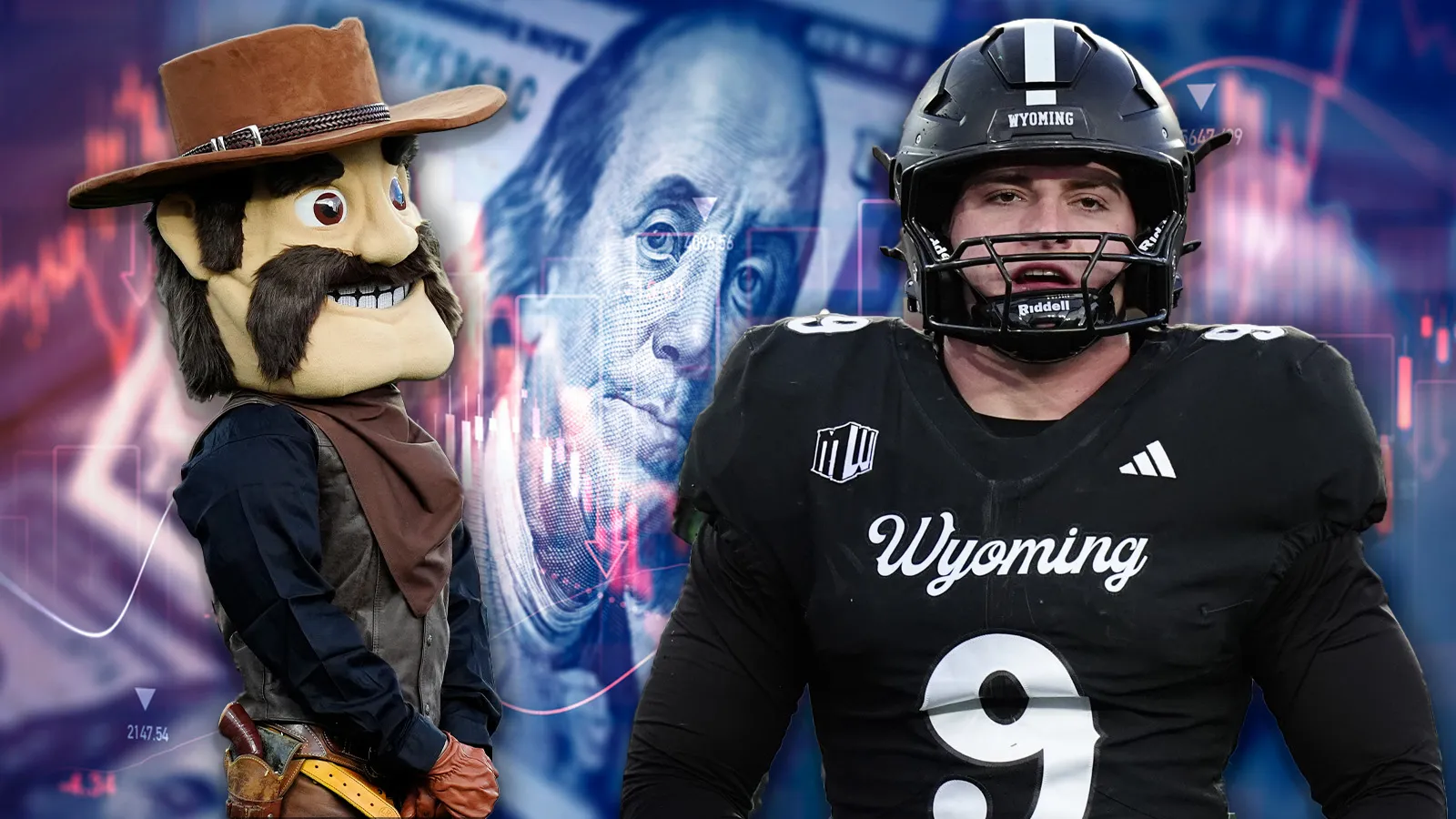
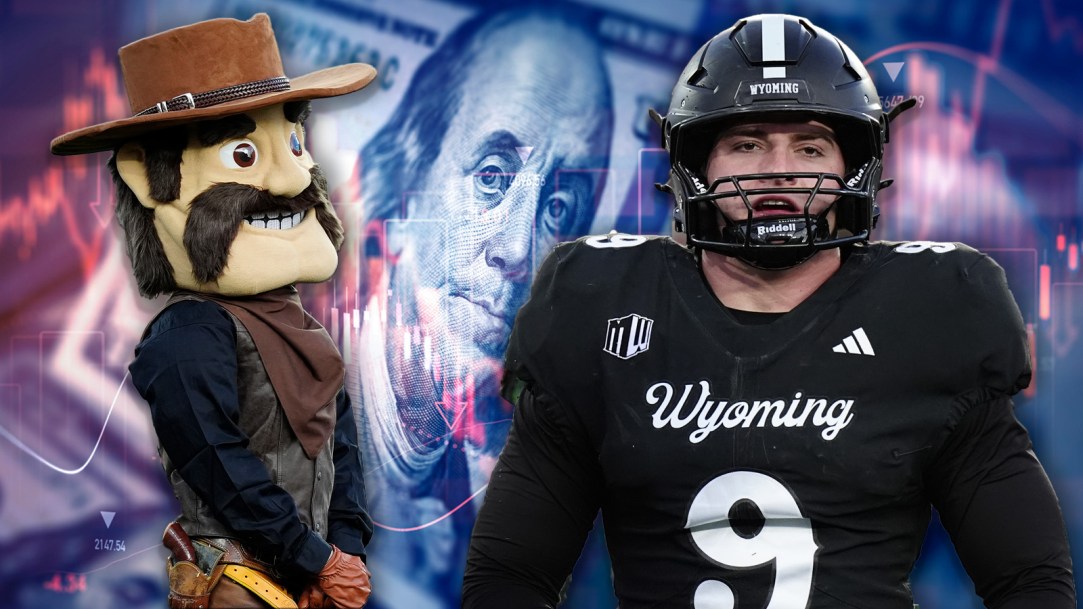
Wyoming is at a serious disadvantage when it comes to NIL. The Cowboys have less money available to pay their athletes than (at least) two nearby universities on a lower level of college football.
Meanwhile, those (at least) two schools are lobbying for their spot in the Mountain West.
This unique situation creates something of a college football case study. At what point is an unsuccessful program forced to move up or down based on financial wealth? Is it time to create a relegation system?
Wyoming is rich, but still broke.
It is no secret that college football is no longer an amateur sport. Players are getting paid, sometimes millions of dollars, and the teams with the most amount of money are able to purchase the best players. Having the best players typically leads to success. Money can buy a national title.
That puts Wyoming in an awkward spot. According to David Madison of the Cowboy State Daily, the Cowboys spend only $1.4 million on its entire roster.
That is the relative cost of just one superstar player in power conferences.
Meanwhile, schools like Montana and Montana State are spending closer to $2.2 million in NIL on their respective rosters. I would guess North Dakota State is not too far behind.
There is one key difference between Montana, Montana State and Wyoming. The former two compete in the Football Championship Subdivision. The latter competes in the Football Bowl Subdivision.
Two schools that compete on a lower level of competition spend nearly twice as much as the Cowboys. And it doesn’t make sense because there is plenty of money in/around Laramie. So where is it?
Due to this lack of NIL money, there is a lot of chatter about the idea that Wyoming could move down. The Cowboys might have more success in the FCS against teams with similar NIL budgets than they do in FBS. It’s not a crazy thought!
However, there is still more money to be made as a losing FBS program than a winning FCS program.
Mountain West schools like Wyoming receive approximately $3.5 million annually from the conference’s television deal with CBS and Fox. Big Sky schools like Montana and Montana State make less.
It makes more sense for the Cowboys to stay right where they are.
“The better question is, why are Montana, Montana State begging to get into the Mountain West?” AD Tom Burman Burman told the Cowboy State Daily. “I can tell you that the top tier of the FCS is willing to pay money to join the Mountain West.”
He is not wrong.
According to Sam Herder, North Dakota State is quietly raising the money necessary to make the job to the FBS. According to Matt Brown, the price to “buy into” an FBS league hovers around $10 million.
Thus, it is actually better for Wyoming to lose every game in the FBS than drop down to the FCS. The boosters need to step up and fund a winning program.
NIL
Major college football program predicted to be clear frontrunner for 4,000-yard QB
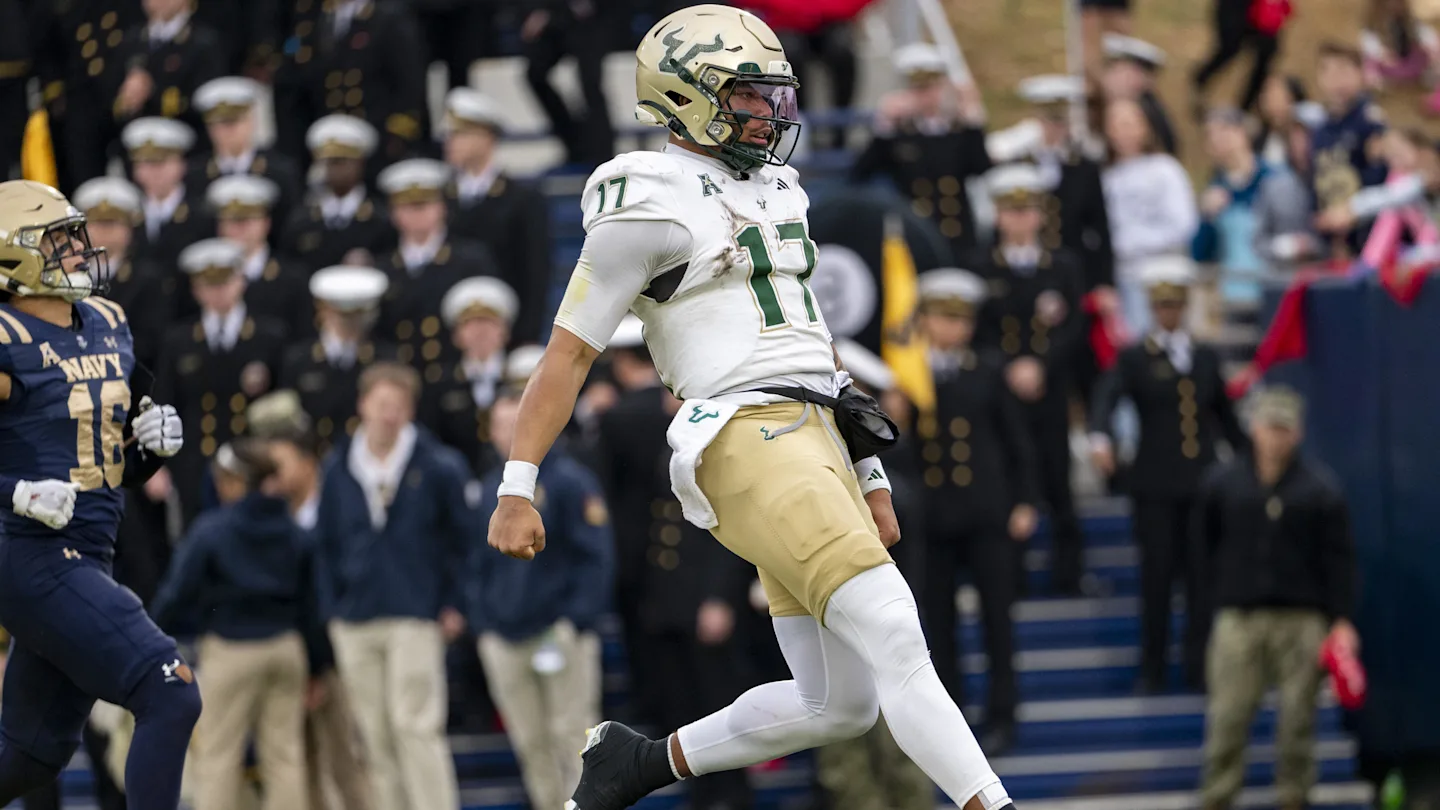
The NCAA transfer portal officially opens for college football players on Friday.
In the final three weeks before the portal opens, quarterbacks began to announce their decisions to enter the transfer portal. DJ Lagway, Dylan Raiola, Sam Leavitt, Josh Hoover, and Rocco Becht will all seek new programs in 2026.
Another quarterback who will be shuffling in the 2026 offseason is South Florida signal-caller Byrum Brown. He will have one season of eligibility remaining at his second school.
While the portal is not officially open yet, Auburn is emerging as a clear destination for Brown next season. The connection to the Tigers is obvious, as former Bulls head coach Alex Golesh accepted the vacancy left by Hugh Freeze on Nov. 30.
Max Olson of ESPN cited the connections between Brown and Auburn in a recent projection for quarterbacks in the transfer portal. Olson said that Brown playing anywhere other than Auburn in 2026 would be a surprise.

“Brown has stayed loyal to his coaches and rejected past portal interest,” Olson wrote. “Now the 32-game starter is ready to prove he can compete at the highest level as a senior.”
The 6-foot-3, 231-pounder arrived under a staff led by Jeff Scott at South Florida in 2022. He played in the maximum four games needed to keep a redshirt, passing for 404 yards, five touchdowns and an interception while rushing for 179 yards and three touchdowns.
Golesh arrived in Tampa during the 2023 offseason. Brown was the Bulls’ starter that season and threw for 3,292 yards, 26 touchdowns and 11 interceptions and rushed for 809 yards and 11 touchdowns. South Florida finished the season 7-6, and Brown set single-season records for passing yards and touchdown passes.
Brown’s 2024 season was derailed by a broken bone in his left leg five games into the season. He totaled 836 pass yards and two touchdown passes while he ran for 269 yards and three touchdowns.
Injuries did not hinder Brown from producing for the Bulls in 2025. He logged 3,158 pass yards, 28 touchdowns and seven interceptions and accumulated 1,008 yards and 14 touchdowns on the ground in 12 games. He was named All-AAC Second Team and College Football Comeback Player of the Year for his efforts in 2025.
NIL
Marcus Freeman announces return to Notre Dame for 2026 after receiving NFL interest
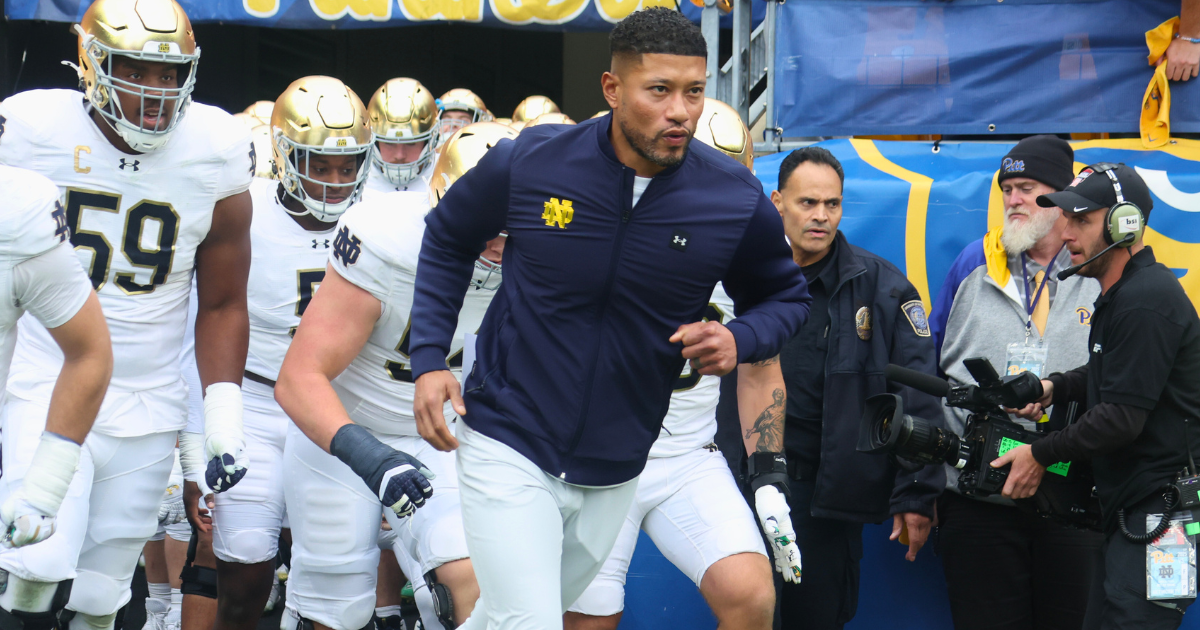
Marcus Freeman reportedly told NFL franchises that he is staying at Notre Dame, according to SI’s Pat Forde. Freeman and Notre Dame reportedly agreed to a restructured contract that puts him in the “top tier” among compensation for college head coaches.
Freeman later tweeted from his official Twitter/X account, seemingly confirming the news. “2026…run it back. Go Irish (clover emoji),” he wrote.
That’s pretty good news for Notre Dame fans, who last saw their team win their 10th straight game before opting out of bowl season. Freeman will now attempt to lead the Fighting Irish to the College Football Playoff and a national championship next season. The work at the college level continues.
Prior to Christmas, NFL Network’s Mike Garafolo reported Freeman was expected to be a top candidate for the New York Giants’ vacancy. That is now no longer the case.
Marcus Freeman running it back at Notre Dame, says no to NFL
Freeman, this season, led Notre Dame to a 10-2 finish in 2025. That included 10-straight wins following an 0-2 start, narrowly (and controversially) missing out of the College Football Playoff as the first team out. The year prior, Freeman led the Fighting Irish all the way to the national championship game before coming up short against Ohio State.
Since becoming Notre Dame’s head coach in 2021 — his first stint as a head coach period — he’s compiled a 38-10 record along the way, including a 5-2 record in the postseason. Because the Irish missed out on the College Football Playoff this season, the program opted out of their bowl game.
“As a team, we’ve decided to withdraw our name from consideration for a bowl game following the 2025 season,” the program said in a statement. “We appreciate all the support from our families and fans, and we’re hoping to bring the 12th national title to South Bend in 2026.”
As far as the Giants are concerned, they won only their third game of the season, a 34-10 victory over the Las Vegas Raiders. They’re bound for a high draft pick and a rebuild under a new coach, but it won’t be Freeman. But man, the drama continues in New York as Jaxson Dart’s father recently called out Danny Kanell over the latter’s comments about the rookie QB.
All Freeman has to do now is worry about Notre Dame this coming fall. The Giants’ search continues.
-

 Motorsports3 weeks ago
Motorsports3 weeks agoSoundGear Named Entitlement Sponsor of Spears CARS Tour Southwest Opener
-

 NIL3 weeks ago
NIL3 weeks agoDeSantis Talks College Football, Calls for Reforms to NIL and Transfer Portal · The Floridian
-

 Sports2 weeks ago
Sports2 weeks ago#11 Volleyball Practices, Then Meets Media Prior to #2 Kentucky Match
-

 Motorsports2 weeks ago
Motorsports2 weeks agoSunoco to sponsor No. 8 Ganassi Honda IndyCar in multi-year deal
-
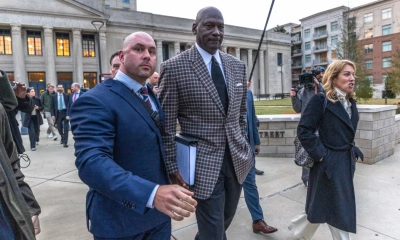
 Motorsports2 weeks ago
Motorsports2 weeks agoNascar legal saga ends as 23XI, Front Row secure settlement
-

 Motorsports3 weeks ago
Motorsports3 weeks agoAccelerating Inclusion: Breaking Barriers in Motorsport
-

 Motorsports3 weeks ago
Motorsports3 weeks agoNorth Florida Motorsports Park led by Indy 500 Champion and motorsports legend Bobby Rahal Nassau County, FL
-
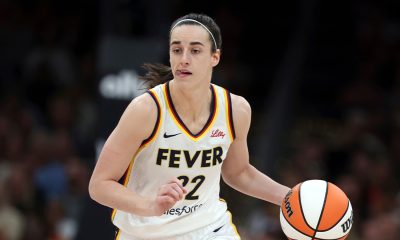
 Rec Sports2 weeks ago
Rec Sports2 weeks agoWNBA’s Caitlin Clark, Angel Reese and Paige Bueckers in NC, making debut for national team at USA camp at Duke
-
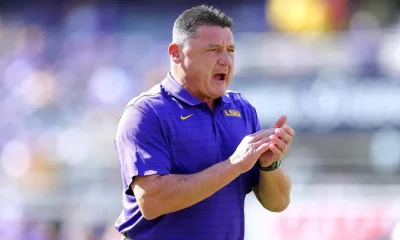
 NIL3 weeks ago
NIL3 weeks agoEd Orgeron: Paying players via NIL would only require a ‘minor adjustment’
-
Motorsports3 weeks ago
NASCAR, 23XI Racing, Front Row Motorsports announce settlement of US monopoly suit | MLex
































